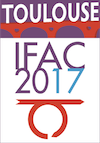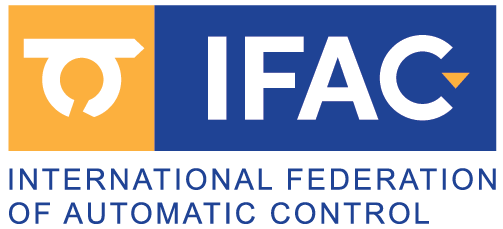The newly updated Open Invited Tracks are: Control and data-driven modelling in biomedicine, Supply Network Engineering, Dynamics, and Control, Multi-agent distributed learning and optimization of dynamical systems, Cooperative control and navigation for UAVs, Optimal control of bioprocesses.
Title: Control and data-driven modelling in biomedicine
Track proposed by: Clara Ionescu, Levente Kovacs
Abstract: This proposal is for an open invited track (OIT) on the problem of control and data-driven modelling in biomedicine. The main goals of this OIT are:
- To address corner issues in control and modelling of biological and medical data, such as: missing data, intermittent feedback information, triggered response data, event based control, time and dose based treatment, etc.
- To enable emerging modelling tools such as fractional calculus, e.g.for characterizing anomalous drug diffusion, LPV-based control, TP transformation, etc.
- To tackle the problem of integrating patient response and medical assist devices within cyber medical systems paradigm, addressing modularity, compatibility, flexibility, emergency response and patient safety. The topic of this OIT falls within the IFAC TC 8.2 Biological and Medical Systems, and the IEEE TCs on Signal Processing and Adaptive Control, on Medical Healthcare Technologies and on CyberMedical Systems.
Title: Supply Network Engineering, Dynamics, and Control
Track proposed by: Dmitry Ivanov, Alexandre Dolgui
Abstract: Current research in supply chain management and engineering has been increasingly focused on the issues of resilience, dynamics and decision-making under uncertainty. It has been accepted by research community that the effects of various sources of uncertainty should be considered during both supply chain design, planning and execution control. In addition, the issues of behaviour prediction and adaptation become more and more important. The research focus is now shifting to a paradigm that the performance of supply networks is to interrelate to dynamics, adaptability, stability, resilience, and crisis-resistance. This special Session aims to summarize recent developments in the field of supply chain resilience, dynamics, control and disruption management from a multi-disciplinary operational perspective that includes different quantitative methods and information technology. The aim of this session is to attract high-quality papers detailing the most recent developments in the field of tackling uncertainties, dynamics, and disruptions in the supply chain. We welcome quantitative analysis contributions from different disciplines of operational research, control theory, system dynamics, and artificial intelligence that provide new insights into the theory and practice of supply chain dynamics, control and disruption management.
Track topics: Following the successful tradition of INCOM 2009, 2012, 2015, MIM 2013 and MIM 2016, the session chairs invite scientists, engineers and decision makers from government, industry and academia to contribute theoretical and applied research papers in areas including but not limited to the following topics: Supply chain design with resilience and business continuity considerations, Trade-off “resilience vs. efficiency” in supply chain optimization, Ripple effect in the supply chain, Quantification of supply chain risk management, Supply chain robustness and stability analysis, Planningsupply chain performance under uncertainty, Creating flexibility and adaptability in the supply chain, Mitigating risks and disruptions in supply chain design, planning and scheduling, Disruption prediction and preparedness, Post-disruption supply chain recovery, Supply chain (re)scheduling
Title: Multi-agent distributed learning and optimization of dynamical systems
Track proposed by: Ruggero Carli, Luca Schenato, Jongeun Choi, Hideaki Ishii, Jerome Le Ny
Abstract: The proliferation of relatively inexpensive devices capable of communicating, computing, sensing, interacting with the environment and storing information is promising an unprecedented number of novel applications through the cooperation of these devices toward a common goal. These applications include swarm robotics, wireless sensor networks, smart energy grids, smart traffic networks, smart camera networks. These applications also pose new challenges, of which distributed learning and optimization is one of the major ones. The objective of this open track is to collect contributions that will provide the most up-to-date state-of-the- art in the growing body of literature in distributed optimization from a dynamical systems perspective. In fact, although a large literature is available in the realms of distributed learning and optimization for large scale static systems, fewer results are available for dynamical systems, i.e. systems that change over time, thus requiring the development of novel tools that are theoretically rigorous while being still practical.
Title: Cooperative control and navigation for UAVs
Track proposed by: Antonios Tsourdos, Helene Piet-Lahanier
Abstract: The use of multiple UAVs for performing a global task is potentially beneficial because of the reduction of embedded equipments required for each vehicle, increased ability and robustness to failure. Management of fleet makes it necessary to develop sense and avoid techniques to insure safety, dynamical task allocation and procedure for exchange of information. These methods must be designed in order to limit the complexity (in terms of communication, relative estimation and distributed control design) and to increase the ability of the fleet to execute complex missions. Over the last few years, increased interest in these topics has led to rapid progress both in theory and practice in various fields such as communication, networks, guidance design or multi-agent modelling. The purpose of this session is present state of the art and recent developments in these research fields and illustration of feasibility through experiment results.
Title: Optimal control of bioprocesses
Track proposed by: Jérome Harmand, Alain Rapaport, Terence Bayen
Abstract: Control of bioprocesses has attracted lots of attention these last years. In a number of situations, stabilizing controllers (such as feedbacks that do not minimize any objective function) is sufficient to propose new management strategies and closed loop controls able to increase significantly process productivity or product quality. However, in a world submitted to globalchanges where environmental constraints are more and more stringent, the necessity of further optimizing processes functioning become a priority. In biotechnology, more than ever, new algorithms are needed to maximize product quality while minimizing energy requirements and environmental impacts. Optimal control theory can then be used to propose specific strategies to be evaluated and confronted to classical control approaches. In a number of situations, optimal techniques present many advantages and, as long as their application is possible with respect to technical requirements (presence of appropriate sensors/actuators), allow a significance improvement of processes functioning when compared to ``classical'' industrial practices. Nevertheless, positivity constraints and non-linearity in the dynamics, that are inherent and typical to biological systems, make the application of optimal control techniques not traightforward at all (for instance: presence of singular arcs, pre-saturation phenomena...). Moreover, previous literature has shown that these particularities make the optimal paths far to be intuitive, reinforcing the interests of optimal control theory for practitioners. In this framework, this invited session entitled "Optimal Control of Bioprocesses" will report on the latest developments of optimal control for bioprocesses.






























